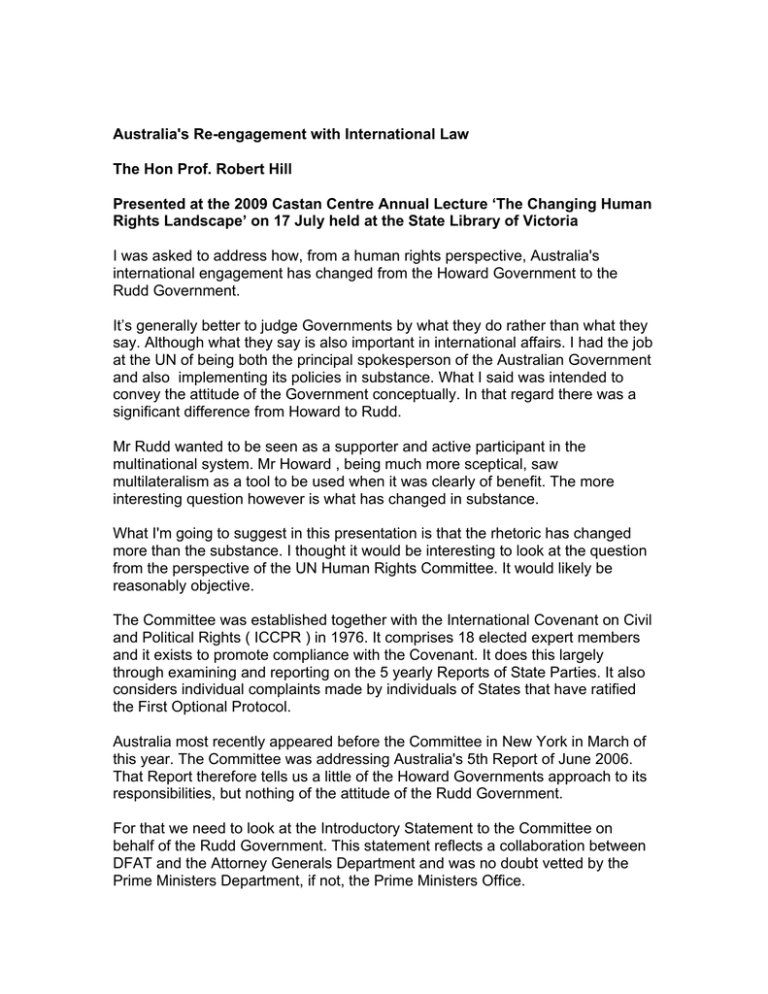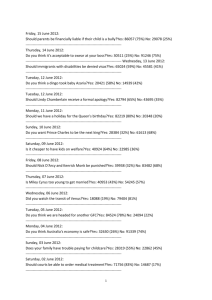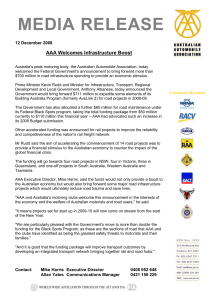Australia's Re-engagement with International Law The Hon Prof. Robert Hill
advertisement

Australia's Re-engagement with International Law The Hon Prof. Robert Hill Presented at the 2009 Castan Centre Annual Lecture ‘The Changing Human Rights Landscape’ on 17 July held at the State Library of Victoria I was asked to address how, from a human rights perspective, Australia's international engagement has changed from the Howard Government to the Rudd Government. It’s generally better to judge Governments by what they do rather than what they say. Although what they say is also important in international affairs. I had the job at the UN of being both the principal spokesperson of the Australian Government and also implementing its policies in substance. What I said was intended to convey the attitude of the Government conceptually. In that regard there was a significant difference from Howard to Rudd. Mr Rudd wanted to be seen as a supporter and active participant in the multinational system. Mr Howard , being much more sceptical, saw multilateralism as a tool to be used when it was clearly of benefit. The more interesting question however is what has changed in substance. What I'm going to suggest in this presentation is that the rhetoric has changed more than the substance. I thought it would be interesting to look at the question from the perspective of the UN Human Rights Committee. It would likely be reasonably objective. The Committee was established together with the International Covenant on Civil and Political Rights ( ICCPR ) in 1976. It comprises 18 elected expert members and it exists to promote compliance with the Covenant. It does this largely through examining and reporting on the 5 yearly Reports of State Parties. It also considers individual complaints made by individuals of States that have ratified the First Optional Protocol. Australia most recently appeared before the Committee in New York in March of this year. The Committee was addressing Australia's 5th Report of June 2006. That Report therefore tells us a little of the Howard Governments approach to its responsibilities, but nothing of the attitude of the Rudd Government. For that we need to look at the Introductory Statement to the Committee on behalf of the Rudd Government. This statement reflects a collaboration between DFAT and the Attorney Generals Department and was no doubt vetted by the Prime Ministers Department, if not, the Prime Ministers Office. The Statement is intended to provide fact but also to covey an attitude. The Rudd Government, in its statement, said that it was firmly committed to achieving adherence with its obligations under the ICCPR and other human rights instruments. At the international level, it said that it was working towards becoming a party to a number of human rights instruments and inviting greater scrutiny by, and engagement with, international human rights mechanisms. It listed the following Accession to the CEDAW Optional Protocol B Becoming a party to the Disabilities Convention and working towards accession to the Optional Protocol Working towards accession to the Optional Protocol to the Convention against Torture The Standing invitation issued to UN Procedures, in August 2008. If this presentation had been a little later, it would also have included the arguably more contentious statement of support for the Declaration of Rights of the Indigenous Peoples. More contentious because it meant splitting with former allies (from the Howard governments consideration of the Declaration) the US, Canada and New Zealand. On the domestic side the Statement referred to The public engagement through the National Human Rights Consultation A commitment to renewed engagement with the Indigenous Peoples as illustrated by the National Apology and the "closing the gap" targets Changes to reinforce "humanity, fairness, integrity and public confidence" in immigration Same sex reforms National security legislative reviews. The Government also referred to its replies to the List of Issues raised in writing by the Committee, since the submission of the Report. There was certainly some substance in this Statement, and perhaps a little spin. This audience is as well qualified as I am to assess how much on the domestic side is rhetoric and how much amounts to real change, but there does seem to be a lot of reviews. There is no doubt however that the Rudd Government, through its Statement, does want to be seen to be engaging seriously, domestically and internationally, in human rights issues. By contrast, the 5th Report itself, written on behalf of the Howard government was dismissive. It provided no new material. The Government referred back to its Common Core Document and argued its approach was in accordance with the harmonised Guidelines elaborated by the UN’s Inter-Committee Meeting of the human rights bodies. The Human Rights Committee disagreed and expressed disappointment. It is a little unfair to compare the enthusiastic engagement of a new Government with one after ten years, but whilst both claimed adherence to international obligations, one saw the UN scrutiny as a burden, the other as a political opportunity. But there is always a political balance, and one Government officials don't always get right. According to the media, Foreign Affairs bureaucrats assessed the Rudd Government would come down on the side of participation in the Durban Plus Conference Against Racism. They believed the Rudd Government would want to be seen to be engaged. At the last moment, the Government withdrew, presumably assessing that the domestic political risk outweighed the opportunity of engagement on a serious international human rights issue. Given the experience of the first Durban conference, the decision is understandable and doesn't necessarily mean the government is less committed to human rights. However, it was interesting that it was made so late. On the issues of substance, it is again useful to turn to the Human Rights Committee. Its Concluding Observations were made on the 7th May of this year. As I said earlier, the Committee criticised the Howard Government for "a failure to provide sufficient and adequate information on the measures adopted to give effect to the Covenants rights as well as the progress made in the enjoyment of those rights". By contrast, the Committee commended the constructive dialogue with the Delegation of the Rudd Government and the way in which the Delegation answered oral and written questions. Specifically the Committee welcomed The current National Human Rights Consultation regarding the legal recognition and protection of human rights in Australia The apology to the indigenous peoples, and The establishment of the National Council to Reduce Violence against Women and Children But then came the sting. It did not see a great deal of change in substance, and reiterated most of its criticisms and concerns of previous occasions. In particular it noted That the Covenant had not been incorporated into domestic law That the Government had not established a mechanism to ensure the compatibility of domestic law with the Covenant That the Government had not provided effective judicial remedies for the protection of rights under the Covenant That the Government had not organised training for the Judiciary on the Covenant and the jurisprudence of the Committee That the Government had not withdrawn any of the Reservations entered upon Australia's ratification of the Covenant That the Government had failed to provide rights of an effective remedy and reparation where there has been a violation of the Covenant That the Government had failed to ensure that provisions of Australia's Anti-Terrorism legislation fully complied with the Covenant That the Government had not acted to ensure that rights to equality and non-discrimination are comprehensively protected in Australia's federal law, and That the Government had failed to ensure that indigenous peoples are sufficiently consulted in the decision making process with respect to issues effecting their rights. The Committee also expressed concern that Some provisions of the Northern Territory Indigenous Response remained inconsistent with the State party's obligations under the Covenant The Government had not granted reparation, including compensation to victims of the Stolen Generation policies There had been insufficient effort to implement the Committees earlier recommendations under the Native Title Act in relation to high costs,complexity and evidentiary requirements The Government needed to strengthen its efforts towards the elimination of violence against women The Committee was also unhappy At reports that persons were still at risk of being returned to a country where there were substantial grounds that they would be at risk That the Government had not taken all necessary legislative and other steps to ensure that no person is extradited to a state where he or she might face the death penalty That the Government had not taken firm measures to eradicate all forms of excessive use of force by law enforcement officials particularly in relation to indigenous people, racial minorities, persons with disabilities and young people That the Government had not strengthened its measures to prevent and eradicate trafficking in human beings. The Committee also Expressed concern that mandatory use of detention in all cases of illegal entry continued, the continuation of the excise zone, as well as non statutory decision making for people who arrive by boat and are taken to Christmas Island Noted gaps in processes that should ensure that children in conflict with the law are treated in consistence with the Covenant and the UN Rules for the Protection of Juveniles Deprived of their liberty Saw continuing lack of adequate access to justice for the marginalised and disadvantaged groups Expressed concerns at reports of an increased number of cases of discrimination of persons of Muslim background and an inadequate response of Government. The Government has yet to respond to the Observations. I'm sure the Government’s first reaction was one of irritation, much like the Howard Government reaction to the Committees previous Observations. I also doubt that the Government will "widely distribute" the Committee’s Observations as was also recommended by the Committee. But the Government will respond, and its comments will be measured. Apart from saying, and reasonably so, that it had not been in Government long, and that many of the issues are subject to current review, it will also say Australia is proud of its human rights record, but acknowledges that there are issues of ongoing concern Australia supports its Indigenous People having more meaningful control of their own affairs Australia believes that not every matter concerning human rights is better dealt with by resort to additional legal sanctions Australia, with respect to those who enter unlawfully, upholds the Covenant and the Refugee Convention but has a legitimate interest in the integrity of its migration program Australia has a Federal system of Government, and responsibility for implementing its obligations under treaties such as the Covenant is shared between Federal, State and Territory Governments. I have, of course, been quoting from the Howard Government response to the Committees previous Observations. Probably the Rudd Government response will be drafted by the same group of conscientious, capable and professional public servants. Thus it seems to me, as it does the Committee, that whilst there have been some changes of substance, a lot remains in much the same form as before. It also illustrates that the challenge of Australian diplomats reacting to a change of Government is not so difficult.






